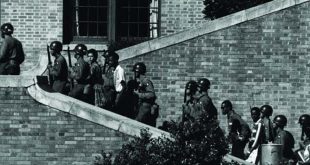It’s curtains for Slobodan Praljak, the Croatian General convicted of war crimes. He’s done dead, committing suicide by publicly drinking poison during an open court session last week. It’s also curtains for the International Criminal Tribunal for the Former Yugoslavia [“ICTY”], a court of dubious validity. The suicide took place as that Court was reading its very last judgment before expiring, now scheduled for December 31, 2017. A fitting end for an ill-begotten exercise in selective prosecution designed to salve the conscience of forces that instigated and facilitated the breakup of Yugoslavia, once a nation state member of the United Nations. Good-by and good riddance.
War is a messy business, a business that deals in death and destruction. The wars that tore former Yugoslavia asunder were no exception. The ethnic parties to the wars, the Serbs, the Croats, the Bosniaks, were all guilty of war crimes. By definition war is a crime. The only issue that needs be addressed is magnitude – culpability is a foregone conclusion, with only identification, arrest, conviction and sentence left to be determined.
The Bosnian Wars resulted in the reported deaths of more than 104,000 soldiers and civilians, some say 200,000, including 12,000 children. At least an additional 137,000 people, some say more, were wounded and maimed. An estimated 20,000 women, some say 50,000, were raped or otherwise sexually abused. An estimated 2,200,000 of the populations of Serbia, Croatia and Bosnia were forced to “flee their homes, making it the largest displacement of people in Europe since the end of World War II”, abandoning and losing their homes, lands and possessions. The financial costs of the war in cost of munitions and military hardware, destruction of property, lost economic opportunity and cost of reconstruction is in the billions of dollars.
Yet for all that mayhem and havoc the ICTY, established by a resolution of the United Nations’ Security Council, in the 25 years of its existence has indicted only 161 individuals, prosecuting and convicting some but not all. The political elite of the warring republics was never indicted except for the Serbs – Karadzic, Milosevic, Krajisnik, Plavsic and Seselj – while noticeably absent without leave were the Croats and Bosniaks – Izetbegovic and Trudjman.
With that being the magnitude of mayhem and havoc, it is impossible that only 161 individuals are responsible. Hundreds if not thousands had to participate, cooperate and otherwise aid and abet yet they have are un-indicted and un-convicted, scot free.
My brief musings on the legacy of ashes that the ICTY leaves is not the place to enumerate ICTY’s sins of commission and omission. That is for another day, but I confess that I am complicit in those sins. I participated in this application of failed and flawed justice.
I actively participated. I was the attorney for two defendants before the ICTY. I went along with the rules of procedure that favored the prosecution. I remained silent in the face of the rules of evidence that were unjust, unfair and just plain unconstitutional, if I can use that term in conjunction with a court without constitutional constraint. I did not fight against a system that was contrary to what justice and the rule of law was meant to be. I remained silent and complicit to my shame. I regret my lack of action. I can now only belatedly sound the alarm.
Slobodan Preljak strikingly committed suicide during the Court’s last official act, the public reading of the denial of his appeal from an earlier conviction for war crimes. You ask “Who in hell is Slobodan Preljak?” He was a man for all seasons – a electrical engineer, a philosopher, a playwright. For most of his working life he was a theater director, a director of well received television dramas and series, documentaries and films. When war came, some call it a war for independence, he volunteered forming a “military unit composed of Zagreb based artists and intellectuals”.
His role in the war was mainly administrative yet receiving a commission as Major General. He held various positions in the Croatian National Defense Council and in the Ministry of Defense for the short lived Croatian Republic of Herzeg-Bosna.
His fatal error was being in the international limelight, in the wrong place, at the wrong time, the town of Mostar, Bosnia and Hercegovina in November, 1993 when the Stari Most, the historic medieval bridge over the Neretva River was blown to smithereens. The actions he was accused of, when taken in context of the war, were puerile in nature. Slobodan was a patsy, not a key player, a card easily discarded and sacrificed for a sad semblance of justice.
So, it’s curtains for ICTY and for its legacy may you not Requiescat In Pace/Rest in Peace.
 Deyan Ranko Brashich is a contributor writing from New York. He is the author of Letters from America, Contrary Views and Dispatches. His contact and blog “Contrary Views” is at www.deyanbrashich.com
Deyan Ranko Brashich is a contributor writing from New York. He is the author of Letters from America, Contrary Views and Dispatches. His contact and blog “Contrary Views” is at www.deyanbrashich.com
 Печат – Лист слободне Србије Политички недељник, актуелна политичка дешавања, друштво, свет, култура.
Печат – Лист слободне Србије Политички недељник, актуелна политичка дешавања, друштво, свет, култура.







